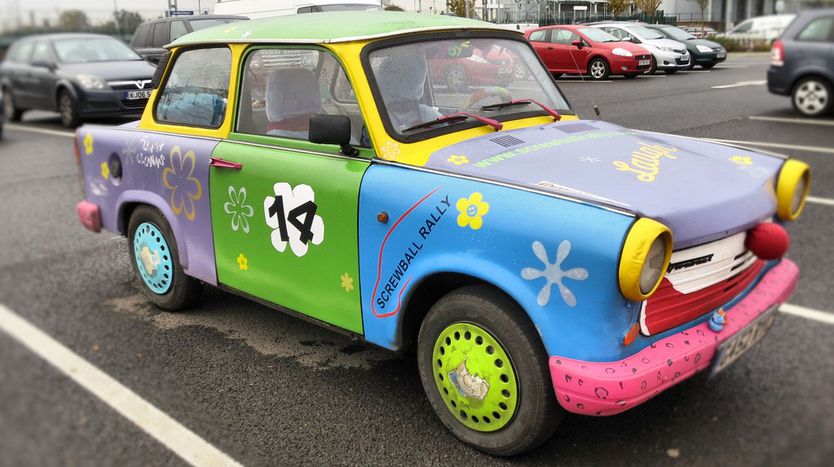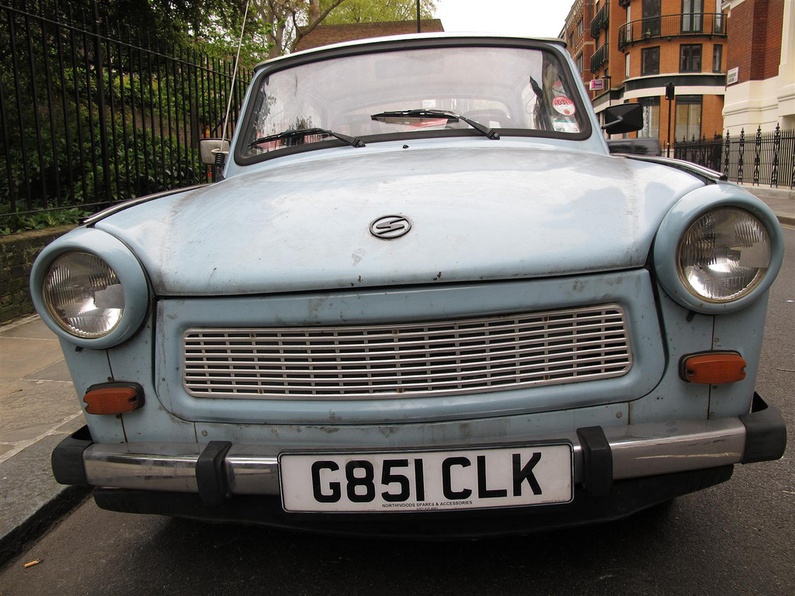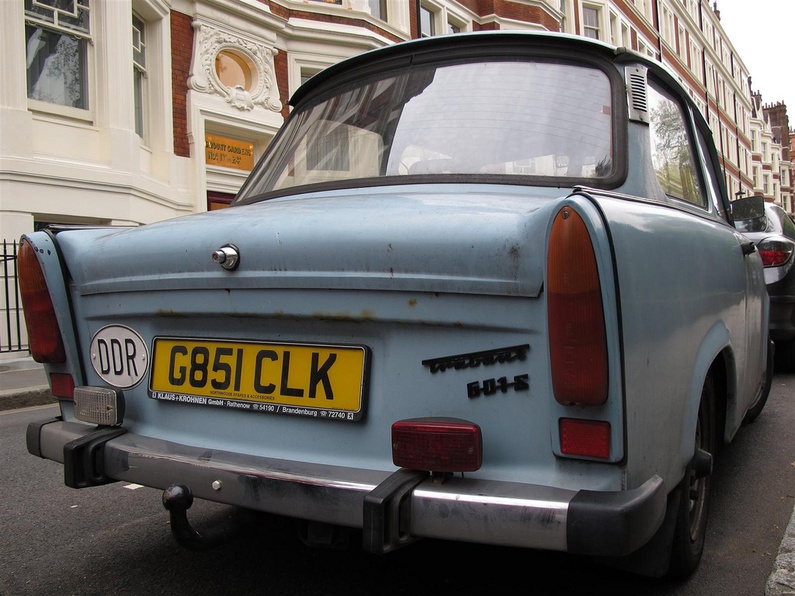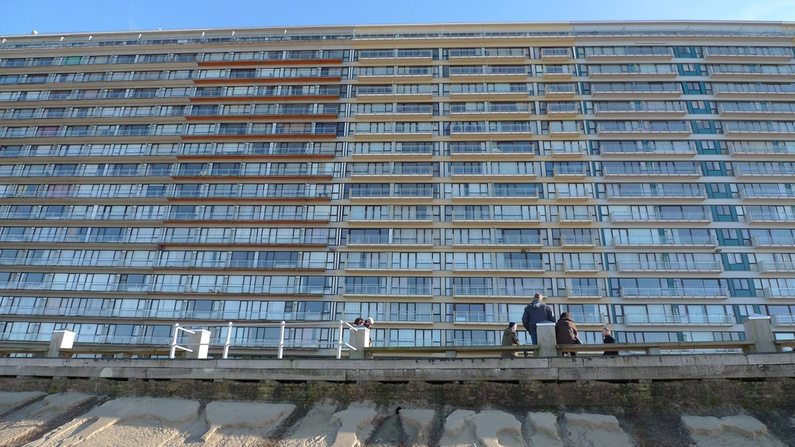
Krakow's Identity Crisis: Communism Clutches to Modernity
Published on
It’s a symbolic year for Poland; it's 10 years since they joined the EU and 25 years since the Berlin Wall fell. Still, the city of Krakow shows the country’s new identity is not black and white: while most tourists swarm over the old town, a popular niche market is found in Communism Tours – including Trabants and vodka. Is it wrong to use the dark side of Polish history to entertain tourists?
The Trabant shakes, grumbles and coughs, struggling along the big road from the old town of Krakow to the socialist style district of Nowa Huta. Nothing seems stable about this car, which is mostly made out of plastic, packs 26 Horse Power and boasts a bicycle-like suspension. It doesn’t seem the most comfortable way to travel - especially not in combination with Poland’s far from flawless roads – but tourists are willing to pay quite some Zlotys for a ride in this socialist ‘rocket’. Why? It’s all part of the communist experience, offered by tour company Crazy Guides.
 While Ukraine is still in a painful position between Europe and Russia, Poland chose sides 10 years ago when it joined the European Union. Polish national pride is amongst the strongest in Europe. Especially among older generations the idea of a supranational organisation still has negative connotations, thanks to Poland’s 40 years as a Soviet satellite state. Why would they want to be part of a brotherhood of peoples again, when instead they can finally form their own identity? Surveys show 60% of Poles consider themselves ‘only Polish’, 35% ‘first Polish, then European’ and only 4% feel like the European identity prevails. At the same time, another recent poll showed only one-in-three Poles think a free market economy is better than a centralised economy, as was the case in the socialist era. Almost the same number believe the introduction of the euro will have negative consequences.
While Ukraine is still in a painful position between Europe and Russia, Poland chose sides 10 years ago when it joined the European Union. Polish national pride is amongst the strongest in Europe. Especially among older generations the idea of a supranational organisation still has negative connotations, thanks to Poland’s 40 years as a Soviet satellite state. Why would they want to be part of a brotherhood of peoples again, when instead they can finally form their own identity? Surveys show 60% of Poles consider themselves ‘only Polish’, 35% ‘first Polish, then European’ and only 4% feel like the European identity prevails. At the same time, another recent poll showed only one-in-three Poles think a free market economy is better than a centralised economy, as was the case in the socialist era. Almost the same number believe the introduction of the euro will have negative consequences.
A vodka a day…
But while some Poles might still dream of socialism, tourists are eager to discover more about a period that seems long gone now. On this foggy and cold March morning, tour guide Jurek is transporting Alice and Simon from Newcastle, England, in his eye-catching Trabant: the car is yellow and covered in multi-coloured flowers. The first stop in Nowa Huta is a restaurant called Stylowa, once the cultural centre of the district. One of the regulars is seated at the bar, drinking his first beer of the day after three vodka’s earlier this morning. The two women behind the bar usually share a vodka or two with him, which doesn’t make the service any faster. At one of the tables, with a small statue of Lenin watching over him, Jurek is giving a summary of the period 1945-1989 in Poland. He illustrates it with propaganda photos and stories his grandparents and parents told him – since he is too young to remember anything of the socialist era himself.
Nowa Huta was built by the USSR in the 1950s, together with and around large steelworks. It was a piece de resistance for the new socialist government and a strong propaganda tool. The big avenues remain, though with different names, and the buildings are covered in grey dust, thanks to the factories which were ever-smoking once upon a time. Not the place to be for most Krakovians, but the Crazy Guides knew 10 years ago that tourists might be interested in this other Krakow. Their leaflet, found in almost every hotel and bar in the city, talks about a ‘private cult tour’, ‘Stalin’s gift to Krakow’ and ‘the good old days’. Jakub, coordinator at Crazy Guides, explains: ‘The communism theme is very catchy and you don’t find many places like Nowa Huta around the world. Our funky, enthusiastic guides add a personal touch to that.’ Started in 2004 as a one-man company, Crazy Guides now works with about 11 different guides.
No bullshit please
Simon and Alice booked the tour because it sounded ‘fun, a bit different’. And, Simon adds: ‘The car was very appealing’. Simon is lucky, because on request it is possible to drive the car yourself for a little while, on a deserted forest road. It is all part of the experience, just like the apartment building Jurek invites his ‘group’ to visit next. Crazy Guides rents this apartment for different reasons than the other 80, 000 (20, 000 less than in 1989) inhabitants of Nowa Huta: this specific apartment is their own museum, furnished solely with furniture from the 50’s and 60’s. Walking into the apartment it feels like the residents left just minutes ago: there’s an original newspaper on the shiny wooden coffee table and in the kitchen the kettle is waiting on the stove. The vodka distiller in the bathtub is a nice touch.
Simon and Alice seem impressed, touching everything and opening cupboards. Most of the people who take this tour are Europeans, says Jurek, but hardly any of his fellow countrymen ever join. According to Jurek, Nowa Huta doesn’t have a good reputation and the Poles don’t think it will show them anything new. It brings up the question whether it isn’t politically incorrect to take advantage of this darker side of Polish history. ‘We do get criticized,’ coordinator Jakub confirms back at the Crazy Guides-HQ. ‘But this is usually by people who have no idea what we show and tell on our tour. From the outside it might look as if we’re having too much fun and glorifying communism. But we try not to get too political and as long as our guides don’t bullshit, they can give their own opinion. Their stories should focus on the social aspect of the socialist era, still part of our collective memory.’
Autobus czerwony, an old Polish Communist song
Picturesque
Could Poland’s identity be a composite formed from both seven centuries as a big empire and four decades as a socialist country? Is it the fusion of these two periods that makes Poland what it is today; the Poland that joined the European Union? According to Alice and Simon, it is exactly this contrast that makes a city like Krakow so interesting. ‘When I thought about Poland, I thought about all the British stag parties that come here,’ Alice tells. ‘Now I know there is so much to do in Krakow we don’t even have enough time for it.’ Does the image of Nowa Huta overshadow the other side of Krakow, as a city of kings? Simon hesitates. ‘Actually I would like to think in a few years I remember Krakow as the city with both sides. But to be honest I think I will mostly associate it with the old town. It’s just more picturesque, you know.’ As for the Crazy Guides, they are ‘honestly a little bored’ with the communism tour. ‘We think we can export this concept to any other area of the city’, says Jakub. ‘Our strength lies more in the personal stories than in this great socialist neighbourhood, to tell you the truth.’
THIS ARTICLE IS PART OF A SPECIAL SERIES DEDICATED TO KRAKOW. IT'S PART OF "EUTOPIA: TIME TO VOTE", A PROJECT RUN BY CAFÉBABEL IN PARTNERSHIP WITH THE HIPPOCRÈNE FOUNDATION, THE EUROPEAN COMMISSION, THE MINISTRY OF FOREIGN AFFAIRS AND THE EVENS FOUNDATION.





